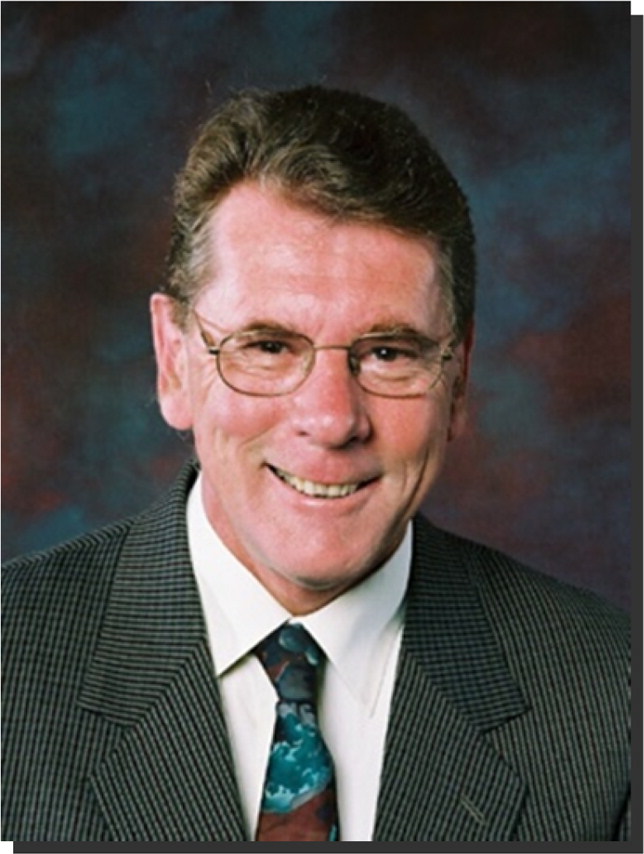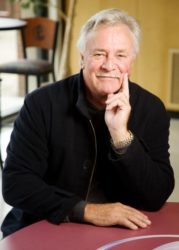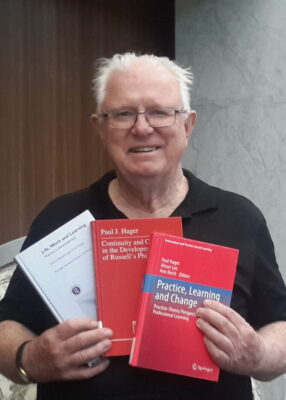PESA Agora is pleased to provide this EPAT article which is a Tribute to James (J.C.) Walker, former PESA President and EPAT Executive Editor and Fellow of PESA. There are five tributes to him and another from Kevin Harris that you can view.
James (J.C.) Walker completed his Master’s degree at the University of Sydney (1969) with First Class Honours and the University Medal. He also took his PhD in philosophy of science (1973) at Sydney. He was Postdoctoral Fellow at the Boston Center for History and Philosophy of Science. He was Associate Professor at the University of Sydney. At Canberra University he was Professor and Foundation Dean of Education, and also Director of the Centre for Research in Professional Education. At the University of Western Sydney he was Professor and Dean of Education and Director of the Greater Western Sydney Learning Network. He is currently Director of Maxma Associates Pty Ltd., specialising in consultancy in organisational learning, and is academic advisor to Executive Leadership Australia. James has held visiting appointments at London, Toronto, Boston, Colorado and Harvard Universities, Tvind College Denmark and the German Youth Institute, Munich. He was Adjunct Research Professor with the Australian Centre for Research in Organisational, Vocational and Adult Learning at the University of Technology, Sydney.
James is a Fellow of the Australian College of Education and recipient of the Distinguished Service Award from the Australian Council of Deans of Education. He has been a member of numerous government policy advisory committees at state and commonwealth levels and has represented Australia in policy development projects in the UK, USA, Hong Kong and OECD, Paris.
James is a Fellow of the Philosophy of Education Society (PESA). He was Review Editor of Educational Philosophy and Theory (1987–1995), becoming Executive Editor in 1995, a position he held for three years.
He is the author of five books and 185 articles, including the acclaimed Louts and Legends: Male Youth Culture in an Inner City School Sydney (1988). In addition to educational philosophy and policy, James has had strong interests in youth culture, lifelong learning, professional, organisational and workplace learning, emotional intelligence, emotional and social learning and development, and human consciousness in terms of systems theory and chaos/complexity theory.
- - - -
James is suffering the effects of an advanced cancer and so I was very appreciative of his efforts to conduct this interview. At one stage he emailed:
Hi Michael,
Today I am recovering from the efforts of moving back home after a month in hospital. Doing nothing but sleep. With my cancer there is always an underlying fatigue, which makes any task difficult.
So I can answer questions that require only a paragraph or two but anything more than that is impossible.
When I fully recover from what has been laid on top of the basic fatigue – i.e. surgery and radiotherapy – I should be able to achieve more. This could be weeks rather than days.
Rest assured that I am committed to this project and appreciate your initiative in conducting it.
I asked him ‘I wonder in the interview whether you want to acknowledge your cancer?’
He responded: I am struggling a bit with a backlog of tasks that built up while I was in hospital. I will think about acknowledging the cancer. How do you think it would add to the professional story?
I wrote: Not so much adding to the professional story but informing others that know you – so personal interest especially for those who know you.
He responded: OK, no harm in mentioning it.
Actually, Jim’s cancer did affect the interview because it was a huge struggle for him to answer any question more than a brief paragraph.
- - - -
Michael: Jim, it is a pleasure to interview you after all these years. I attended my first PESA conference in NZ in the early 1980s and you had a fearsome reputation on the floor. When it came to the crunch you were very kind and helpful to me on the paper that reviewed the thesis of ‘knowledge as production’. Can you recall your first engagement with PESA and what it was that which determined your commitments to the organisation? Perhaps you might also say something about your academic background, motivations and the events that led to your PhD?
James: I inherited an interest in philosophy from my father who, having studied philosophy himself, advised me to study it at university because ‘It will teach you how to think’. It did; and more. I majored in philosophy and was entranced by epistemological questions, in particular how can we know anything? I decided on a career in philosophy and embarked on a PhD in Sydney University’s philosophy department, widely regarded, in the 1970s, as one of the best in the world. David Armstrong was my supervisor.
I adopted a Popperian approach to philosophy of science – how do we know?
And a Quinean approach to knowledge in general – what is the nature of knowledge?
I always wanted to understand how knowledge was applied in practice, and so my master’s thesis was on theory and practice. This was in the field of Education, which attracted me precisely because it is a field in which knowledge from basic disciplines such as psychology, sociology and philosophy can be applied. So I regarded philosophy of education as applied philosophy.
At the time – late 1960s and early 1970s – there was a burgeoning interest philosophy of education, particularly focused on the London University Institute of Education and led by Professor R.S. Peters.
I had become interested in philosophy of education because I had been looking for a field of applied philosophy, and Dr Bill Andersen had begun teaching it this way. I did Bill’s courses and thrived on his teaching. Eventually we became good friends and colleagues.
I became committed to philosophy of education as my career path, so when the Philosophy of Education Society of Australasia was established it was only natural that I should become a member. This opened up a fine range of new contacts, especially trans-Tasman, notably Ivan Snook.
PESA’s annual conferences proved to be good forums for philosophical debate, particularly over the pros and cons of conceptual analysis, of which I was a somewhat militant opponent.
Michael: This is interesting. My question is what do you mean by ‘militant’?
And why did you feel so strongly? I guess this has to do with analytic philosophy in general and it’s refraining from normative commitments based on the illusion of its meta-philosophy – the ahistorical myth that it is just a method?
James: I say ‘militant’ because I regarded the influence of the London Institute of Education as imperialist and extending its methodology (conceptual analysis) through power and prestige rather than argument. London regarded itself as the home and centre of philosophy of education. It was a paradigm that needed powerful exposure through argument. Evers and my arguments pitted theory development against conceptual analysis: in other words we took a Popperian approach.
The term ‘analytic philosophy’ covers a range of approaches – it was only the conceptual and linguistic approaches that we decried.
PESA has proved an invaluable mainstay for philosophy of education, particularly as designated university positions in the field began to decrease in the 1970s, a trend which has never been reversed. Even as I and others were promoted up the academic hierarchy we were unable to stem the decline.
Michael: On EPAT in 2009 you wrote:
James: ‘My final significant relationship to PESA was as editor of EPAT 1996–1999, during which time publication of the journal was moved to a commercial publisher. Although there were some worries that this move would result in commercial interests undermining academic values, this appears not to have occurred, and there has been a pleasing, and large, swelling of the society’s financial resources.’
Michael: I wonder whether there is something more that you would like to add about the three years you were Editor of EPAT. We are certainly indebted to you for shifting EPAT to a commercial publisher. Since then the journal has generated generous funds for PESA. It is flourishing with over 300 papers submitted and the development of two new OA journals – PESA Agora – https://pesaagora.com/ – and Access. An important issue. During your time as Editor, you also professionalized the journal, right?
You were both President of the Society and also Editor. Can you describe your experience during these years. What were the issues for you at that time?
James: As I recall, an issue that was running while I was President of PESA, and had been running for some time, was qualifications for membership of the society. Should applicants have formal training in philosophy or philosophy of education, or was an interest in philosophy of education sufficient? Over time membership has become available to anyone with an interest – i.e. membership is open. This was accompanied by a more liberal editorial policy in EPAT: fewer rigorously ‘philosophical’ papers were published. Perhaps these represented the ‘theory’ in ‘educational philosophy and theory’, as distinct from the ‘philosophy’.
During my editorship of EPAT there was a debate over whether we should move into a commercial relationship with an academic publisher or continue to publish the journal ourselves. At an AGM the matter was resolved in favour of the former, and I approached Carfax. In 1998 I visited Carfax at Oxford to establish a close relationship. Those against the move to a commercial publisher had feared that we would lose editorial control, but this was secured in the contract.
Michael: During the 1970s there was a Marxist phase in philosophy of education. So what were the influences on you in the Marxist phase and how long did it last. How would you characterize your thinking after 1990? You were classified at one stage as one of the ‘Australian Marxists’ in philosophy of education – you, Kevin Harris and Michael Matthews – can you say something about this label and your classification? You worked with Colin Evers on pragmatism? Was this an extension? What was the influence of Wal Suchting?
James: Marxism was in the philosophical zeitgeist at Sydney University, and I was attracted to it as much as I felt an impetus from social-political critique emanating from anti-Vietnam war protests and the ‘student movement’ more broadly. Then there were those within the Education domain, such as Bowles and Gintis in Schooling in Capitalist America who applied Marxism directly to education. There were no philosophers or philosophers of education that I drew upon with reference to Marxism. Since I could read German I studied Marx himself in German as a philosopher, from Hegel’s influence through to Das Kapital.
The differences in viewpoint between ‘Australian Marxists’ were greater than whatever Marxism they might have shared. For example I did not share adherence to the ideas of Louis Althusser championed by Wal Suchting of the Sydney Philosophy Department.
Pragmatism was another matter altogether, where I was persuaded by Colin Evers. For a while we held Marxian ideas alongside Quinean pragmatism. I relinquished the Marxism by 1990 but still hold to a Quinean holistic epistemology. After 1990 my thinking was basically holistic pragmatism.
Another strand of my career was in professional learning – this led to fruitful exchanges with Paul Hager and colleagues at UTS.
While Dean of Education at Canberra University I was also Director of the Centre for Research in Professional Education.
My work influenced the Vice Chancellor to decide that the mission of the university was to be ‘educating professionals professionally’. This led to productive interaction between Education, Nursing, Pharmacy, Computer Science, Architecture and so on.
As Dean of Education I began to focus on the professional education of teachers.
Critical to the education of teachers is a grasp of the relation between theory and practice. I was interested in this since my master’s thesis, in which I argued that this relation is epistemological, in particular in that much good theory comes from critical reflection on practice (e.g. Donald Schon The Reflective Practitioner). This concept should be central to professional education in all professional fields.
Philosophically, scrutiny of the theory/practice relationship requires a combination of epistemology and the theory of practical reason. Unfortunately, to my knowledge, this is not taught anywhere in Education courses, including teacher education.
From a Quinean point of view educational knowledge was fragmented and weak because there was no consilience – the different areas of the domain either isolated themselves or attacked other areas. No one understood the significance of the unity of knowledge.
Around 1990 there was a debate about whether competency-based standards should structure teacher education and assessment. I published on this topic and so did Paul Hager, and we had a useful exchange of views. I had met Paul through PESA and we had both done our PhDs in Philosophy at Sydney University.
Michael: My question around this is – was it a move out of university? I am very interested in this phase, what relation it had to your work in philosophy of education, and how you conceived professional education.
James: This move needs to be understood in relation to organisational learning, a field into which I moved as a consultant, not professional learning. My major consultancy in organisational learning was with Centrelink, the Australian government agency responsible for distributing financial benefits, which has constant problems of organisational coordination between head office in Canberra and shopfront branches across the whole country. There were other contracts, including with well known consultancy firms such as KPMG.
In my academic work in this field, I worked out the philosophical assumptions underpinning various forms of organisational communication, demonstrated how these influenced communication effectiveness, and examined the implications for what individuals and organisational units had to learn and how to learn, to improve effectiveness.
Yes, it was a move out of universities. By the late 1990s I had become disillusioned with academic politics and with undermining of attempts at curricular reform. I had already dabbled in consultancy work relating to organisational learning and professional practice and had found it rewarding. I was able to re-engage in these activities whilst maintaining relevant academic and theoretical connections as Adjunct Professor at UTS – very congenial with Paul and others.
Actually, this work in organisational learning and professional practice has significant implications for philosophy of education in general. Two of its major findings are, firstly, that learning by groups or teams is typically a distinctive kind of learning that is not reducible to learning by individuals; and, secondly, that a degree of holism is essential for satisfactory understandings of professional practice and the development of expertise. In this field, which covers the vast bulk of human learning that takes place outside of formal education systems, the whole is certainly greater than the sum of the parts. Because formal schooling has been the dominant focus of philosophy of education, it is understandable that up to now this discipline has typically assumed that learning is best understood by focussing on individuals. Likewise, a further dominant assumption within philosophy of education has been that human performances are best understood by atomising them into their component parts. Hence major attention has been directed to the cognitive aspects of human performances, with much less attention to other important aspects of these holistic performances, such as affect, know-how and the various influences of context. It appears then that traditional philosophy of education is ripe for some theoretical renovation.
Michael: Perhaps a word about organisational learning and why it mattered to you?
James: When I took up the position of dean at Canberra University in 1990 the faculty was highly dysfunctional and on the verge of going broke. Its structure encouraged built-in failures in communication and conflicts of interest. My manner of implementing a restructure was heavy-handed and failed. I needed to know why, and what I could do different.
A good friend, Professor Vivienne Robinson, referred me to Professor Chris Argyris of Harvard Business School, from whom I learned about organisational learning. Two key aspects are blocks to learning embedded in organisational routines, and mutual learning. I never looked at academic relations, especially academic politics, the same way again.
I also found Argyris’s work, and that of his followers in Action Design, intellectually exciting. I became more effective as an academic leader.
Michael: If EPAT was to develop a special issue on organisational learning what themes should it investigate?
James: Why not an issue on schools and universities as learning organisations?
What is the difference, if any, between individual and organisational learning?
Michael: What other issues do you think EPAT ought to be pursuing today?
James: Complexity theory is a powerful entrant into the natural and social sciences. Paul Hager and David Beckett have written a very fine book – The Emergence of Complexity: Rethinking Education as a Social Science. EPAT could well devote a special issue to this book, which I believe will become a landmark in the study of educational theory and practice, linking, as it does, study of ideas with study of agency, practice and expertise.
*****
I would like to thank Paul Hager for helping to organise this interview and for working with James to craft a couple of paragraphs on organisational learning, and for organising and editing the tributes to James Walker.





